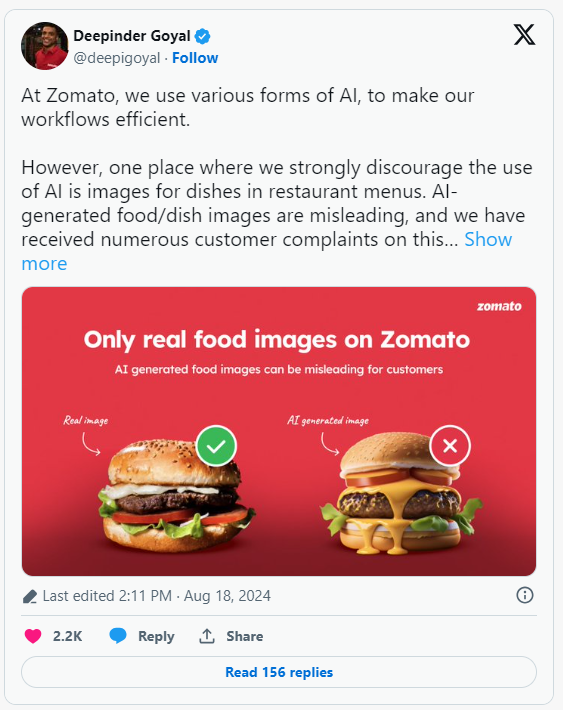Recently, the editor of Downcodes learned that Zomato, a well-known food delivery platform in India, has made a major decision: prohibiting restaurants from using AI-generated food images on its platform. This decision stems from issues such as increased customer complaints, increased refund rates, and declining restaurant ratings caused by AI images. Zomato CEO Deepinder Goyal emphasized that this move is aimed at maintaining customer trust and ensuring the healthy operation of the platform.
Recently, Zomato, India's mainstream food delivery platform, made a major decision. They announced that they will ban the use of AI-generated food images on restaurant menus. Deepinder Goyal, CEO of Zomato, said that this move is to protect the trust of customers, because the use of these AI images has brought about a series of problems, such as increased customer complaints, increased refund rates, and decreased restaurant ratings.

Goyal noted in a post that from now on, they will encourage restaurant partners to stop using AI-generated images of dishes. Zomato plans to proactively start removing AI-generated images from the platform by the end of this month and will use automated technology to detect and reject uploads of these images as much as possible.
For those restaurateurs who haven’t invested in authentic food photography yet, Zomato recommends that they contact the company’s catalog support team to arrange professional photography services. It is worth mentioning that this service is provided at cost price and Zomato does not make any profit from it.
In addition to the requirements for restaurants, Zomato's marketing team also received instructions to ban the use of AI-generated food images in promotional materials in the future. This shows how seriously Zomato takes this issue.
Although Zomato has taken a hard stance in this regard, they are still active in generative AI. The company has a person in charge of generative AI, Vaibhav Bhutani, who is working on some interesting projects, such as developing multi-agent systems to recommend food choices and enhance user participation and experience.
Additionally, Zomato recently launched a “group ordering” feature that allows users to share links with friends and family so that everyone can add food to the same shopping cart, eliminating the need to send a phone call to collect everyone’s orders. . This feature is being gradually rolled out to all users, simplifying the process of ordering food for groups.
Highlight:
?Zomato announced that it will ban the use of AI-generated food images on restaurant menus to maintain customer trust.
?Restaurant owners can contact Zomato to get professional food photography services at no profit
Zomato is still actively investing in generative AI to drive the development of multiple new features
Zomato's move reflects its emphasis on user experience and platform credibility, and also provides a reference for other platforms. At the same time, while Zomato is actively exploring the application of AI technology, it also pays attention to avoiding its potential risks, which is worthy of recognition. In the future, the standardization and standardization of AI applications in the food industry will be an important issue.